Thanh Hoa With a university degree, traveling from North to South to buy white-eared jungle fowl to breed, after many failures, Mr. Chinh now owns a billion-dollar farm.
The chicken farm of Mr. Le Do Chinh, 33 years old, is located deep in a small winding alley in Dong Cuong ward, Thanh Hoa city. From afar, you can hear the crowing of roosters and the cooing of doves. "Wild chickens are quite sensitive to noise, so they need to be raised in a quiet area with few people passing by to limit disturbance to the livestock," said Mr. Chinh.
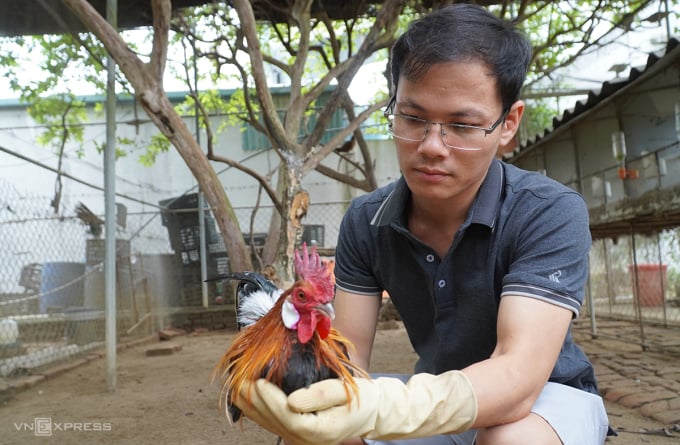
Mr. Le Do Chinh meticulously takes care of his chickens every day. Photo: Le Hoang
In the middle of the morning, after throwing a basket of food to the adult chickens, Chinh quickly went back to the barn to check the water and temperature for the nearly month-old chicks, then went back to collect the eggs. According to the farm owner, raising wild chickens is not hard work but requires meticulousness and diligence. Chinh and his young wife take on most of the farming work on the farm, from cutting vegetables, mixing bran, vaccinating, cleaning the barn...
Le Do Chinh studied Business Administration, a field unrelated to animal husbandry. Having been passionate about agriculture since childhood, after graduating from university, he worked in construction for three months in Hanoi but found it unsuitable so he decided to return to his hometown to start a business with wild chickens.
Chinh said that when he was a student, he happened to visit a zoo and was attracted by the chickens with colorful feathers, bright red combs and distinctive white ears. He then spent a lot of time learning about this strange breed of chicken.
"I consider this a valuable chicken breed because few people raise them," said Mr. Chinh about his chance to start raising white-eared jungle fowl. He added that "we have to find a different direction because if everyone could do this job, it would be too simple, even though we might face many risks."
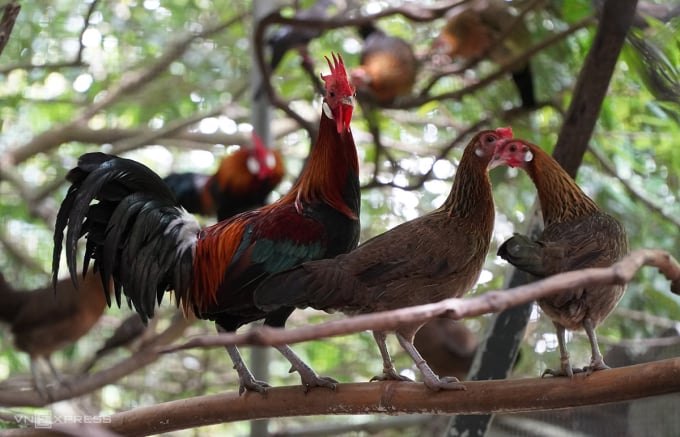
White-eared junglefowl have a very beautiful appearance and like to live on tree branches like in the wild. Photo: Le Hoang
In 2014, after getting married, Chinh decided to return to his hometown to raise chickens. He used half of his father's garden of more than 4,000 square meters to build a barn. Many people "disparaged and criticized" when they saw a young man who had just graduated from college returning to his hometown to raise chickens. However, Chinh was encouraged and supported by his parents and wife with the idea.
He traveled all over the country, from the North to the North, sometimes to the Northwest, sometimes to the Central Highlands, looking for wild chickens to breed. Because he had no experience, all the chickens he brought back died after only a few days. The wedding money of more than 100 million VND was "burned" on the dream of white-eared wild chickens. In the first four years of starting his business, Chinh "threw out the window" about 500 million VND.
Not giving up, Chinh borrowed money from friends and relatives to continue buying chickens with the belief that "he would be successful in the near future". Learning from his failures, he traveled everywhere, to remote mountainous areas to buy and learn how to raise purebred white-eared jungle fowls.
Having mastered the technique, Chinh returned to his hometown to re-plan the barn. The entire farm was fenced with nets to prevent the chickens from flying out. At the same time, he planted more green vegetables to proactively provide natural food sources for the chickens, and planted many trees for them to perch and sleep on the branches as in the natural environment.
Mr. Chinh said that when he first raised the chickens, he fed them too much, causing them to become overfed, their crops to swell, and they died for no apparent reason. Once, he noticed that the chickens liked to eat vegetables and fruits, so he proactively reduced the amount of bran and corn, and increased the amount of tubers, green vegetables, earthworms, etc. "Wild chickens live in the wild with very little food, so feeding them too much is not suitable for their wild habits," said Chinh.
Thanks to the correct application of techniques, Mr. Chinh has continuously bred new batches of white-eared chickens successfully. Currently, his family's flock has 2,600-2,700 chickens, worth billions of VND. Although he has continuously expanded the area and quantity, there is still not enough supply for the market.
On average, he sells 250-300 chickens per month, earning about 50 million VND. The total annual revenue from the chicken farm is about 1 billion VND. After deducting expenses, Chinh makes a profit of 500-600 million VND.
The adult white-eared junglefowl weighs just over a kilogram, its meat is very firm and delicious, so many people buy it. In addition to its commercial value, white-eared junglefowl are also used as ornamental chickens. Due to the huge market demand, Mr. Chinh mainly sells breeding chickens. Chicks after hatching about 2.5 months old cost 500,000 VND per pair, breeding chickens cost about 1.2-1.6 million, the most expensive is up to 2.4 million VND per pair. The price of ornamental chickens depends on the chicken but the lowest is one million VND per chicken. Mr. Chinh's market is spread across the provinces.
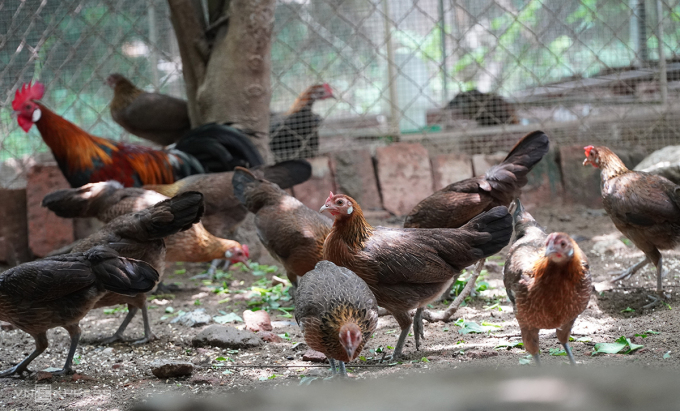
Mr. Chinh's family farm currently has nearly 3,000 chickens of different ages, most of which are breeding chickens. Photo: Le Hoang
After gaining experience, Mr. Chinh also wrote a book on techniques for raising wild chickens. Three evenings a week, he livestreams to share his experiences and answer questions for those who share the same passion and want to try raising this rare breed of wild chicken.
According to Mr. Chinh, the most difficult part of raising white-eared jungle fowl is taking care of 1-2 month old chicks. This is the time when chickens are sensitive to the weather, so it is necessary to ensure suitable temperature, enough drinking water and clean coops...
In addition, jungle fowl are wild and easily stressed, so noise should be minimized or they will be scared and fly around, refusing to eat. An important factor when raising jungle fowl is that the farm must have many trees, both to provide shade and to provide a place for the chickens to live day and night without the need for complicated cages.
"It is impossible to apply traditional or industrial chicken farming processes to raising wild chickens," said Mr. Chinh. For example, when injecting H5N1 vaccine, if the dosage is the same as for normal chickens based on age, wild chickens will certainly die from drug shock, because this species is usually smaller in weight. Therefore, farmers must reduce the dose to suit their growth characteristics.
In addition to wild chickens, Mr. Chinh's farm also raises hundreds of turtledoves, bringing in tens of millions of dong in additional income each year. According to the farm owner, turtledoves are quite easy to raise, and their food source is similar to wild chickens, so he lets them reproduce naturally. Turtledoves can also collect excess food from chickens and do not require special care techniques.
Mr. Chinh wants to expand the farm and widely disseminate the technique of raising white-eared junglefowl to many households, contributing to the development of the local economy.
White-eared junglefowl farm of Mr. Le Do Chinh. Video: Le Hoang
Mr. Nguyen Huu Hong, Chairman of the Dong Cuong Ward Farmers' Association, assessed that Mr. Chinh's family's white-eared jungle fowl farm is a highly effective economic model with very stable product output.
"Wild chickens eat very little, so they save costs and don't require much care. They have good resistance and their meat is rich in nutrients, so their economic value is quite high," said Mr. Hong, adding that the Ward Farmers' Association is planning to expand the wild chicken farming model to neighboring households. However, the biggest difficulty is that the initial investment capital for breeding chickens is relatively large, so some people are still hesitant.
Source link


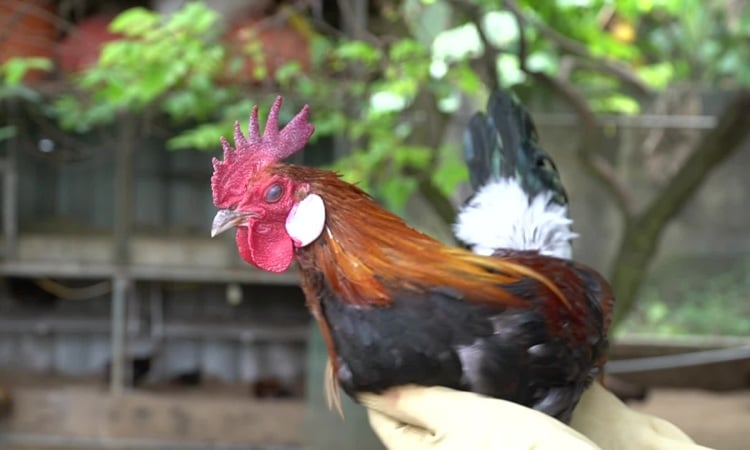

































![[Photo] "Beauties" participate in the parade rehearsal at Bien Hoa airport](https://vstatic.vietnam.vn/vietnam/resource/IMAGE/2025/4/11/155502af3384431e918de0e2e585d13a)










































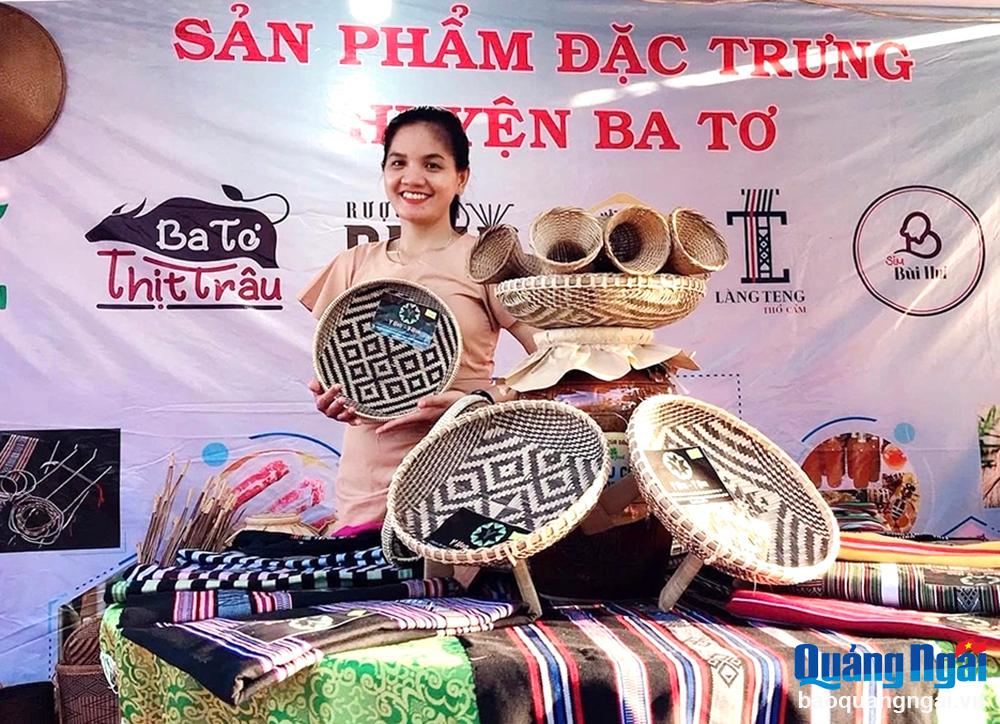




















Comment (0)